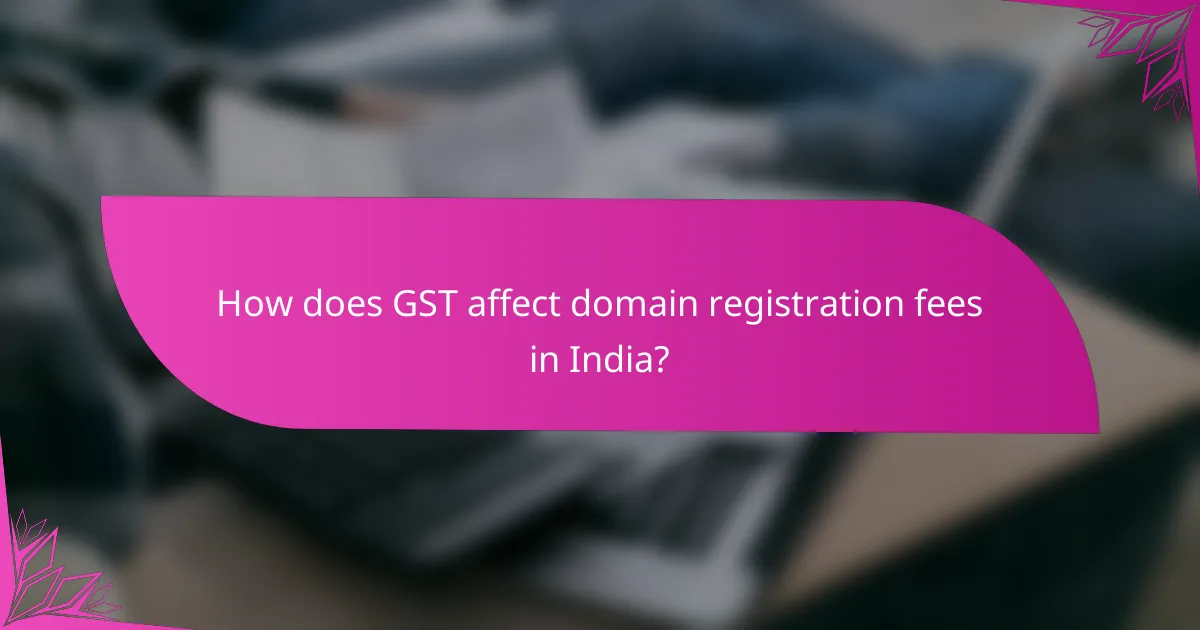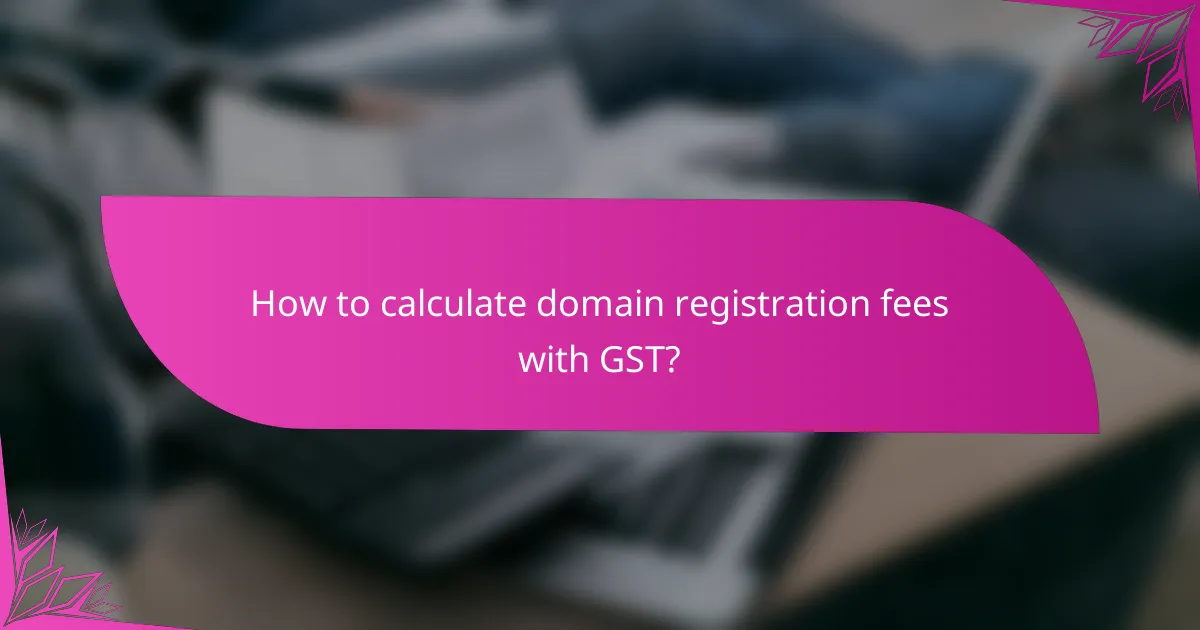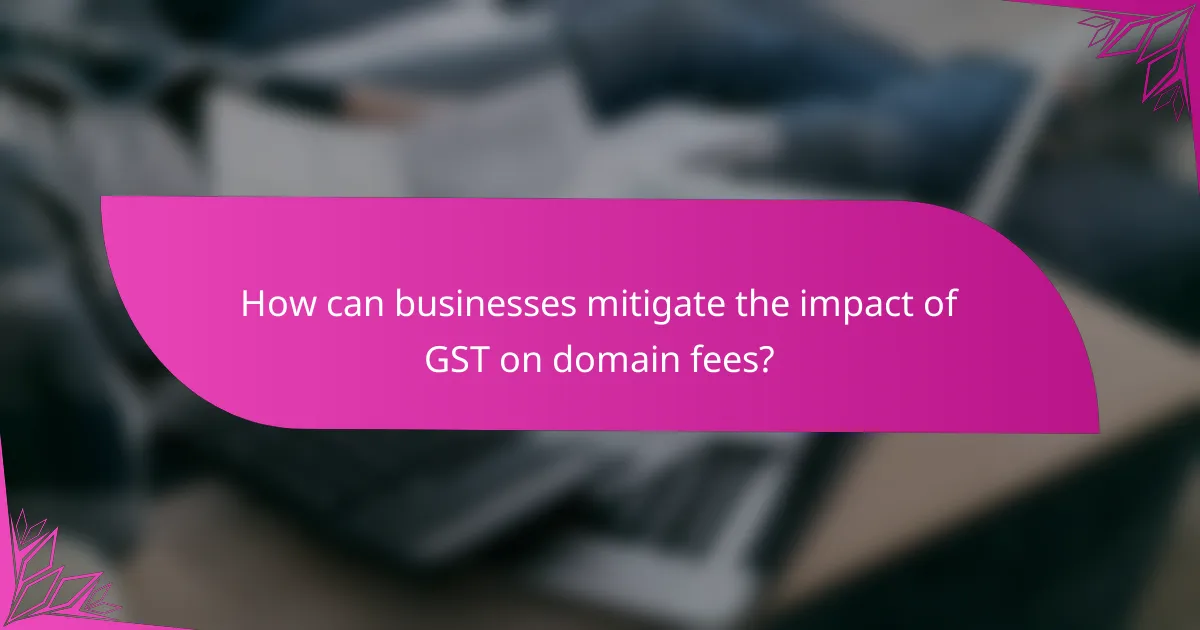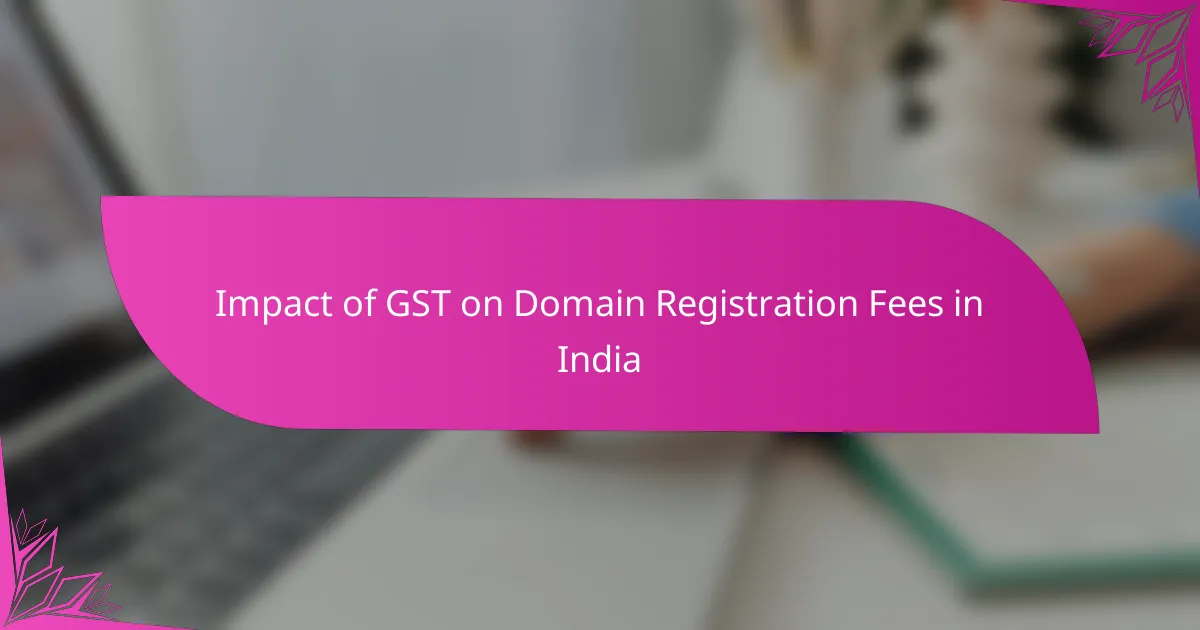The introduction of Goods and Services Tax (GST) in India has significantly impacted domain registration fees, resulting in higher costs for registrants. With a standard GST rate of 18% applied to these services, the overall pricing structure for domain names has changed, affecting both new registrations and renewals. Understanding how to calculate these fees, including the base amount plus GST, is essential for anyone looking to register a domain in India.

How does GST affect domain registration fees in India?
The introduction of Goods and Services Tax (GST) in India has led to an increase in domain registration fees. Registrants now face higher costs due to the inclusion of GST in the overall pricing structure, which affects how much they pay for domain names.
Increased costs for registrants
With the implementation of GST, domain registration fees have seen a noticeable rise. Previously, registrants paid a base fee, but now they must account for an additional 18% GST on top of that fee. This means that a domain costing INR 1,000 would now cost INR 1,180, significantly impacting budget considerations for individuals and businesses alike.
Furthermore, the increase in costs can discourage new businesses from establishing an online presence. Small enterprises, in particular, may find the additional expense burdensome, leading to a potential decrease in the number of new domain registrations.
Impact on pricing strategies of registrars
Domain registrars have had to adjust their pricing strategies in response to the added GST. Many registrars have opted to pass the full cost of GST onto customers, while others may absorb some of the costs to remain competitive. This strategic decision can affect their market positioning and customer retention.
Additionally, registrars may introduce promotional offers or bundled services to attract customers despite the higher fees. For example, offering discounts on multi-year registrations or including additional services like web hosting can help mitigate the impact of increased costs on registrants.

What are the GST rates applicable to domain registration?
The Goods and Services Tax (GST) applicable to domain registration fees in India is set at a standard rate of 18%. This rate applies to most digital services, including the registration and renewal of domain names.
Standard GST rate of 18%
The standard GST rate of 18% means that if you register a domain name for, say, INR 1,000, an additional INR 180 will be added as tax, bringing the total to INR 1,180. This rate is uniform across various service providers in India, ensuring consistency in pricing for consumers.
When budgeting for domain registration, consider that this tax will affect your overall costs. It’s advisable to factor in this 18% when comparing different domain registration services to avoid surprises during checkout.
Exemptions for certain services
While domain registration typically incurs the standard GST rate, some specific services related to domains may be exempt from GST. For instance, services that are purely educational or charitable in nature might qualify for exemptions, depending on the provider’s classification.
To determine if a particular service is exempt, check with the service provider or consult the latest GST guidelines from the Indian government. Always ensure you understand the nature of the services you are purchasing to avoid unnecessary tax liabilities.

How to calculate domain registration fees with GST?
To calculate domain registration fees with GST in India, you need to determine the base fee of the domain and then apply the Goods and Services Tax (GST) to that amount. The GST rate for domain registration services is typically 18%, which is added to the base fee to arrive at the total cost.
Base fee plus GST calculation
The base fee for domain registration varies depending on the domain extension (like .com, .in, etc.) and the registrar you choose. Once you have the base fee, calculate the GST by multiplying the base fee by 0.18. Finally, add this GST amount to the base fee to get the total registration cost.
For example, if the base fee is INR 1,000, the GST would be INR 180 (1,000 x 0.18), making the total cost INR 1,180.
Examples of total costs
Here are a few examples of total costs for domain registration with GST included:
- Base fee of INR 500: Total cost = INR 590 (500 + 90)
- Base fee of INR 1,200: Total cost = INR 1,416 (1,200 + 216)
- Base fee of INR 2,500: Total cost = INR 2,950 (2,500 + 450)
These examples illustrate how the total cost increases with the base fee, emphasizing the importance of considering GST when budgeting for domain registration in India.

What are the implications for businesses in India?
The introduction of Goods and Services Tax (GST) has significant implications for businesses in India, particularly regarding domain registration fees. Companies must now account for an increased cost structure due to the additional tax burden imposed on these services.
Increased operational costs
With the implementation of GST, domain registration fees have seen an increase as the tax is applied to these digital services. Businesses can expect to pay an additional 18% on top of the base registration fee, which can add up significantly over time, especially for companies registering multiple domains.
This increase in operational costs may require businesses to reassess their budgets and allocate more funds towards digital assets. Companies should consider this when planning their annual expenses and look for ways to optimize their overall digital strategy.
Impact on small businesses and startups
Small businesses and startups are particularly affected by the rise in domain registration fees due to their limited financial resources. The additional GST burden can strain their budgets, making it more challenging to establish a strong online presence.
To mitigate these impacts, small enterprises should explore cost-effective domain registration options and consider bundling services that may offer better value. Additionally, they may benefit from seeking out promotional offers or discounts from domain registrars to offset the increased costs associated with GST.

How can businesses mitigate the impact of GST on domain fees?
Businesses can mitigate the impact of GST on domain registration fees by implementing strategic budgeting and selecting cost-effective registrars. These approaches can help manage the increased costs associated with the Goods and Services Tax (GST) imposed on domain services in India.
Budgeting for increased expenses
To effectively budget for increased domain registration fees due to GST, businesses should first assess their current expenses and forecast future costs. This includes accounting for the additional GST charges, which can add a percentage to the overall fee, typically around 18% in India.
Creating a dedicated budget line for domain expenses can help businesses avoid unexpected financial strain. Regularly reviewing and adjusting this budget based on usage and market rates will ensure that companies remain financially prepared for any fluctuations in domain registration costs.
Choosing cost-effective registrars
Selecting a cost-effective registrar is crucial for minimizing domain registration fees. Businesses should compare various registrars based on their pricing structures, including any additional fees that may be subject to GST. Some registrars may offer promotional rates or discounts that can significantly reduce overall costs.
Additionally, consider registrars that provide bundled services, such as web hosting or email accounts, which can offer better value. Reading customer reviews and checking for hidden charges can also help in making an informed decision to ensure that the chosen registrar aligns with the budget and service needs.

What are the long-term effects of GST on the domain registration market?
The implementation of GST in India has led to significant changes in the domain registration market, primarily affecting pricing structures and competition among registrars. Over time, these changes may lead to a more streamlined market with fewer players but potentially better services.
Market consolidation among registrars
GST has prompted many smaller domain registrars to reevaluate their business models, leading to potential consolidation in the market. As compliance costs rise, smaller companies may struggle to compete, resulting in mergers or acquisitions by larger firms.
This consolidation can benefit consumers through improved service offerings and more competitive pricing from larger registrars that can leverage economies of scale. However, it may also reduce choices for customers as the number of available registrars decreases.
Potential for price adjustments
With the introduction of GST, domain registration fees in India may experience adjustments as registrars reassess their pricing strategies. Initially, some registrars raised prices to accommodate the new tax structure, but over time, competition may drive prices down again.
Customers should be aware that while some registrars may offer promotional rates, the long-term pricing could stabilize at higher levels than before GST. Monitoring different registrars for price changes and promotional offers can help users secure the best deals.

What are the trends in domain registration post-GST implementation?
Since the implementation of GST in India, trends in domain registration have shifted notably, with an increase in costs and a heightened focus on compliance among businesses. The introduction of GST has led to a more structured taxation framework, influencing how companies approach their digital presence.
Shift towards digital services
The GST implementation has accelerated the shift towards digital services, as businesses recognize the importance of establishing an online presence. Many companies are now prioritizing domain registration as a crucial step in their digital strategy, leading to a surge in demand for domain names.
This trend is particularly evident among small and medium enterprises (SMEs) that are increasingly investing in digital marketing and e-commerce platforms. The convenience of online transactions and the necessity for a professional online identity have made domain registration a vital component for these businesses.
Increased awareness of compliance
With the introduction of GST, there is a growing awareness among businesses regarding compliance and regulatory requirements. Companies are now more cautious about ensuring that their domain registrations align with legal standards, which has led to a more informed approach in selecting domain names.
This heightened awareness has prompted businesses to seek guidance on compliance-related issues, including the importance of registering domains that reflect their brand and adhere to GST regulations. As a result, many organizations are investing in legal consultations to navigate the complexities of domain registration and taxation effectively.

What future changes can be expected in domain registration fees?
Future changes in domain registration fees in India may be influenced by adjustments in the Goods and Services Tax (GST) rates. As the government reviews tax structures, domain registration costs could fluctuate based on these revisions.
Possible revisions in GST rates
The GST rates applicable to domain registration services can change based on government policy and economic conditions. Currently, the standard GST rate for such services is around 18%, but this could be subject to review.
Any potential reduction in GST rates could lead to lower domain registration fees, benefiting businesses and individuals looking to establish an online presence. Conversely, an increase in GST could raise costs, making it essential for consumers to stay informed about tax changes.
Monitoring announcements from the GST Council and understanding the implications of these changes will be crucial for anyone involved in domain registration. Keeping an eye on budget sessions and tax reforms can provide insights into future pricing trends.
